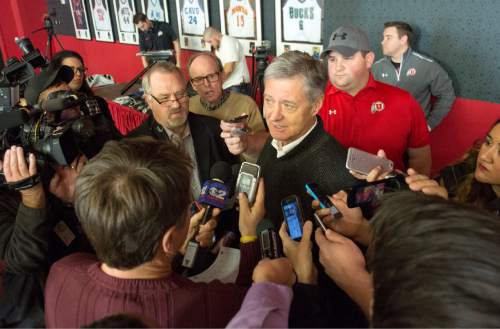This is an archived article that was published on sltrib.com in 2016, and information in the article may be outdated. It is provided only for personal research purposes and may not be reprinted.
Last year in the NCAA's first autonomy session between the 65 power-conference schools, sweeping changes rolled through college athletics: cost of attendance stipends, more medical care, guaranteed four-year scholarships.
This week, the NCAA stared down the biggest issue in sports — overly long hours for athletes — and put it back on the shelf for another year.
The five biggest conferences in college athletics pushed back several proposals to address excessive time put on athletes during this week's NCAA meetings in San Antonio, citing a desire to further study and discuss the issue and pledging to hammer out new, more comprehensive proposals this summer and vote on them in a year.
In the meantime, another year will pass in which athletes spend as much as 40 hours a week devoted to their sport in addition to school and the normal demands of a young adult life, according to NCAA surveys. In the NCAA's own news release, former Oklahoma football player Ty Darlington was quoted expressing disappointment.
"I feel like this should be done already. We've had an entire year to talk about these things," Darlington said in the statement. "This is frustrating for us. What are we doing today that's significant? When I leave here today, what have I done to significantly impact the student-athlete experience? Nothing."
Darlington is right on at least one count: The issue has been studied a lot — by the Pac-12, in particular — in the past year. The conference had a symposium with athletes and administrators to delve into the issue. Between practices, film sessions, time on the training table and travel hours, mounting time demands have raised concerns the NCAA is deviating from its stated mission of offering an education to more than 460,000 athletes across the country.
The problem is that not all sports are created equal, and not all athletes need the same things. The nuanced nature of the time demands issue almost defies a catch-all solution.
"In the first year of autonomy, there was a lot of pent-up proposals, and we had a pretty full docket of items we were trying to move through the system," Pac-12 commissioner Larry Scott said. "But it's difficult to deal with time demands that way. There's so many sport-by-sport ramifications."
Utah sent two athletes to Pac-12 headquarters last October to discuss time demands: women's basketball sophomore Tanaeya Boclair and men's swimming junior Luis Macias.
Aside from sessions in the practice facility, weight room and training room, Boclair will spend almost every other weekend away on road trips for Pac-12 play this winter. She said it's a misconception that practice and games eat up all the time. But plenty of other things do.
"When practice starts at noon, a lot of us have to come to the training room to get our ankles taped, or get wrapped, and there's not much else you can do with that time," Boclair said in an interview last fall. "Travel days. Study hall. There's a lot of extras that come with your sport that you can't really change."
On the other hand, Macias has a limited amount of time in the pool — 20 hours a week — and finds himself budgeting that time very carefully, wishing he had more. Others in individualized sports feel similarly, said Utah athletic director Chris Hill, who sat on the Pac-12's time demands committee.
"Film time is different in one sport than another," Hill said in an interview last fall. "Training time is different for each sport. The whole idea of time demands is so hard to figure out, I don't think it's going to be a set issue."
The Pac-12 pushed forth two proposals that were tabled: a two-week dead period after each sport, and a prohibitionary eight-hour period at night to give athletes a chance to sleep. But the NCAA pushed back both, hoping for more comprehensive reform next year.
Both the NCAA and the Pac-12 have established more inclusive governance structures to add student voices. Both Boclair and Macias told The Tribune that they felt heard and appreciated at Pac-12 meetings last fall.
But so far on time demands, the voices haven't yet led to reform. Change will have to wait.
Twitter: @kylegoon



